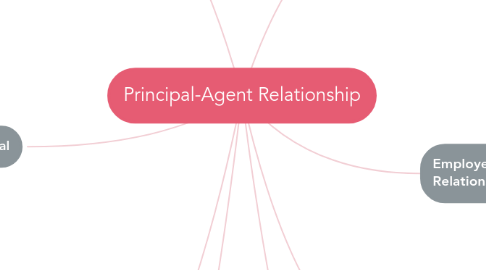
1. How Agency Relationships Are Formed
1.1. Consent by one person to another that the other shall act in his/her behalf and subject to his/her control, and consent by the other so to act.
1.2. Benefits
1.2.1. Agent gives consent to work for the benefit of the principal
1.2.2. Allows business to grow to be able to retain more agent relationships
1.3. Risk
1.3.1. Liability to the principal
2. Agents Duties To The Principal
2.1. Performance
2.1.1. Implied condition in every agency contract is the agreement to use reasonable diligence and skill in performing to complete the work
2.2. Notification
2.2.1. To notify the principals of all matter that come to his/her attention concerning the subject matter of the agency
2.3. Loyalty
2.3.1. To act solely for the benefit of the principal and not in the interest of the agent or third party
2.4. Obedience
2.4.1. A duty to follow all lawful and clearly stated instructions of the principal
2.5. Accounting
2.5.1. A duty to keep and make available all property and funds received and paid out in behalf of the principal
2.6. Benfits
2.6.1. Agent allows principal to keep a successful workplace and maintain a profit while the agent follows rules and regulations of the principal
2.7. Risks
2.7.1. Principal risks his/her business by hiring new agents and trusting in his/her behavior
2.7.2. Agent can cause liabilities for the principal if he/she does not abide by the rules of the principal
3. Types of Agent Authority (Actual, Apparent)
3.1. Actual
3.1.1. Express
3.1.1.1. Clear, direct, and definite terms given orally or written
3.1.2. Implied
3.1.2.1. To do what is necessary to carry out his/her express authority and accomplish the objectives of the agency
3.2. Apparent
3.2.1. The given right to the principal with either words or action to cause a third party to believe they have authority to act
3.3. Benefits
3.3.1. Apparent authority gets put in place after a pattern of conduct by the principal over time
3.4. Risk
3.4.1. In apparent authority, even if the agent changes his/her mind on the subject, the principal may be prevented for denying that the agent has authority
4. Termination of Agency
4.1. Once the relationship has ended the agent no longer has rights to the principal
4.2. Benefits
4.2.1. Notice of termination can be written or orally given to agent from principal
4.3. Risks
4.3.1. Agent can try wrongful termination, which would result in a breech of contract
5. Agency Relationship
5.1. Relationship between an agent and a principal, where the principal has the right to control the agents actions when it includes the rights of the agent.
5.2. Benefits
5.2.1. Relationship is created to act in benefit to the principal
5.2.2. Can bind the agent to a contract of work
5.2.3. Keeps business functioning
5.3. Risks
5.3.1. Agent misrepresentation can create a loss and can be under the liability of the principal
5.3.2. Larger taxes need to be paid for having more agents
6. Employee Vs. Contractor Relationships
6.1. Benefits
6.1.1. Employee gets paid, set times, etc.
6.1.2. Contractors are paid by employer, but are not an agent of the employer
6.1.3. Contractors come to serve one objective and are not under any liability of the principal
6.2. Risks
6.2.1. Employee can get hurt and can be under the companies liability
6.2.2. Contractor can take business away from the principal based on the people they get to take part in their business
7. Ratification of Agency
7.1. Makes an agents unauthorized actions, authorized
7.2. Benefits
7.2.1. Before something is ratified, the agent can revoke offer since it is an unaccepted offer
7.3. Risk
7.3.1. If principal is not fully aware of the agents actions, the can rescind offer to ratify
8. Principal's Duties to the Agent
8.1. Compensation
8.1.1. Duty to pay the agent for services rendered
8.2. Reimbursement and Indemnification
8.2.1. Duty to reimburse the agent for the necessary expenses in the reasonable performance of his/her agencies duties and to indemnify an agent for liabilities incurred because of authorized acts and transactions
8.3. Cooperation
8.3.1. Duty to cooperate with the agent and to assist the agent in performing his/her duties
8.4. Safe Working Conditions
8.4.1. Required to provide safe working premises, equipment, and conditions for all agents and employees
8.5. Benefits
8.5.1. Principal allows agent to thrive in the workplace
8.6. Risks
8.6.1. Disputes can arise if duties are not met

